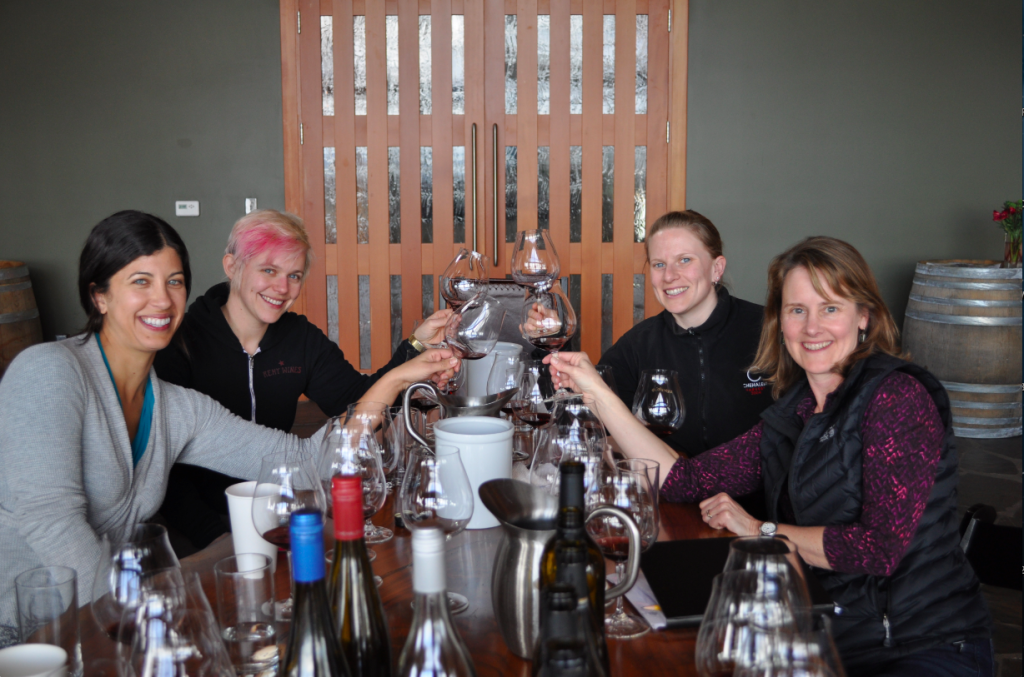
NEWBERG, Ore. – Recent research indicates Oregon can boast at least 39 head winemakers who are female, and yet that represents only about 10 percent of those all-important jobs within the state’s wine industry.
Earlier this year, a series of profiles on women winemakers published on Forbes.com helped shine more light and generated discussion. That inspired Katie Bray of Watershed Communications in Portland to create a roundtable of women who make wine in the Willamette Valley. The four head winemakers were Melissa Burr of Stoller Family Estate in Dundee, Remy Drabkin of Remy Wines in McMinnville, Lynn Penner-Ash of Penner-Ash Wine Cellars in Newberg, and Wynne Peterson-Nedry of Chehalem Wines, also in Newberg.
Last month, Bray invited this journalist to Penner-Ash’s winery in the Yamhill-Carlton American Viticultural Area to moderate the hour-long discussion. It began with each winemaker summarizing their background and was interspersed with a look at samples of recent and older vintages from each winery. The conversation was capped by sometimes humorous, sometimes disturbing examples of male chauvinism that each winemaker has experienced as a woman working in a male-dominated profession.
—
Penner-Ash: I arrived in Oregon in 1988. I worked at Rex Hill for 14 1/2 years and started my label two years prior to me leaving. In 2001, both my husband and I had the opportunity to quit our jobs. He was an elementary school teacher, and I was winemaker/president of Rex Hill. We went into business together and grew the Penner-Ash brand from a mere 125 cases at that time to the scary 10,000 cases today. (She also makes the wines for Dusky Goose and was the founding winemaker for Alexana.)
Peterson-Nedry: I’ve more or less been at the winery since I can remember.
Penner-Ash: Since birth? (Group laughter).
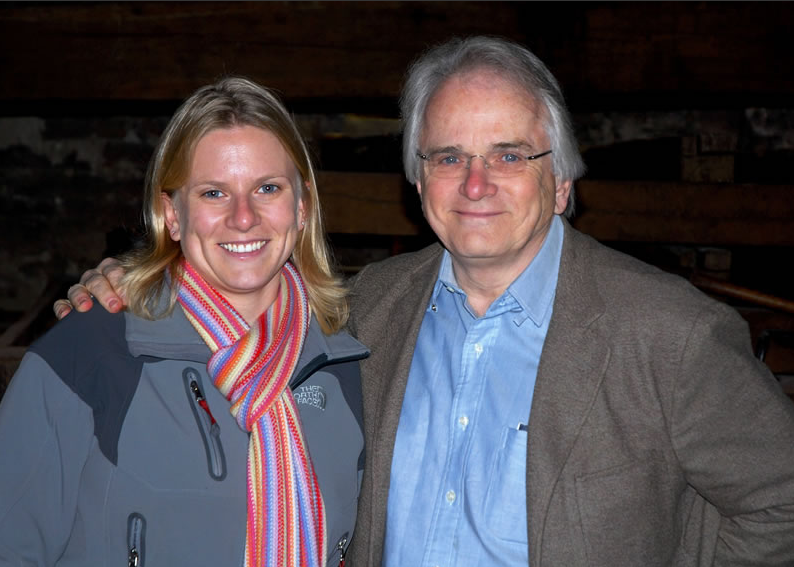
Peterson-Nedry: Yeah, since 1980. My parents (her father is owner/founding winemaker Harry Peterson-Nedry) purchased our first piece of property atop Ribbon Ridge, planted it while working other jobs and started experimental winemaking in our garage. Our first commercial release was 1990 with Pinot Noir. I joined the company in 2009 after getting my undergrad in chemistry (Bryn Mawr College in Pennsylvania) and my master’s in enology and viticulture at (University of California) Davis. And then I traveled the world for a few years doing harvest abroad. I started as the assistant winemaker (at Chehalem) and became the winemaker last year. And I plan to do it for a very long time. We do about 20,000 cases annually, and about 45 percent of that is Pinot Noir. The rest are mostly white wines.
Drabkin: I started the winery in 2006, and I’ve been producing my own wines and giving them away since 2003 (group chuckle). I started working out of a shared-space facility, and I now have my own small, converted warehouse space. I produce about 2,000 cases a year. I have two brands — Remy and Three Wives — and I produce Lagrein, Dolcetto, Sangiovese and Barbera, but I’ve yet to release any more than 800 cases in a year.
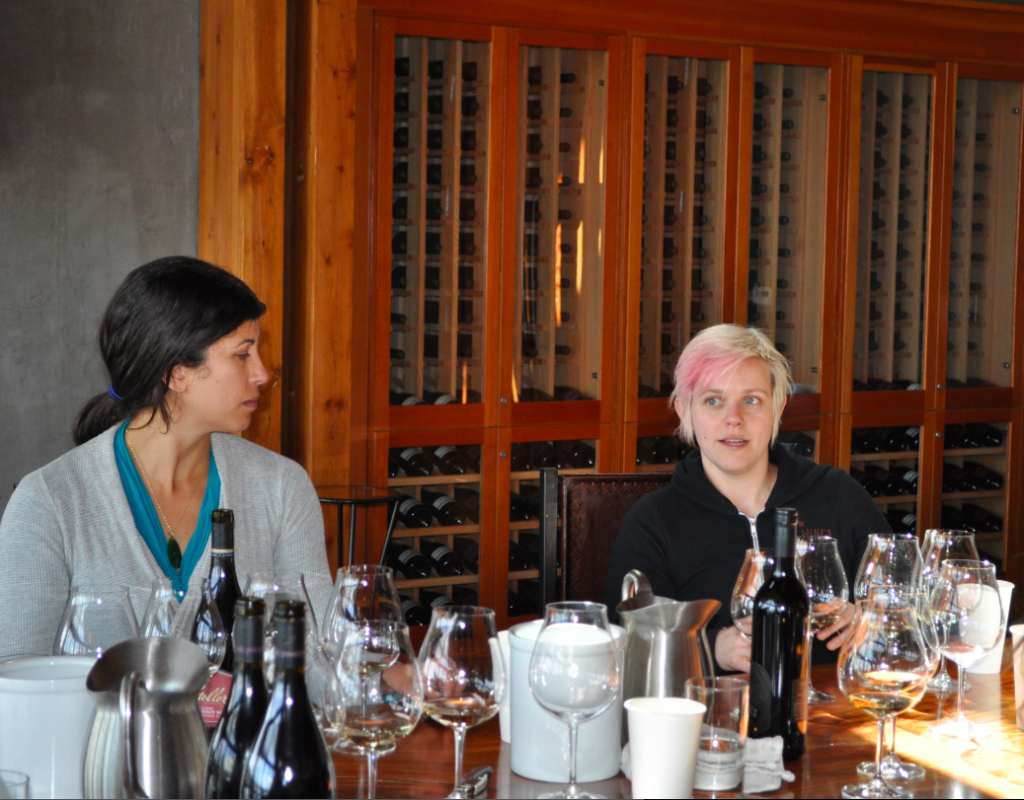
Burr: I was going to go into medicine and got my bachelor’s of science at Portland State. I was going to go to naturopathic college in Portland and had been accepted. That was in the late ’90s. Instead of going to graduate school, I decided to get into winemaking for a couple of reasons. One, the interest in wine was definitely growing and I lived next to some great wine shops and grocers. And it seemed like a better lifestyle for my husband and I. He grew up farming and has a horticulture background. Also, his family purchased an old vineyard in White Salmon, Wash., a year prior to me getting into graduate school. They’ve got 15 acres of 40-year-old vines — half Gewürz and half Pinot — so the whole family was getting into wine together. I turned directions, took a few winemaking courses at Chemeketa (Community College), which was just getting started then, and I got my first internship in 2001 at Cooper Mountain Vineyards in Beaverton. I love them and was really drawn to them because they grow biodynamically, so it was like a calling. And then four days before the fruit came in, the assistant (winemaker) quit, and there really wasn’t a head winemaker. So I was in charge of making 16,000 cases of wine with the vineyard crew. A considerable help was (Oregon winemaker) Rich Cushman. I would call him all day, every day. I was there for two years and got connected with the Stollers. It’s such a small industry that way. I interviewed with them and got the job. I was the first head winemaker for Stoller. Previously, we were making the wine at Chehalem, and Harry made the wines for the Stollers in 2001 and 2002. It was like going to school because I was working with the winery that was working with our vineyards at the time. So in 2003 and 2004, we made the wines at Chehalem and then moved over to the Stollers’ winery in 2005, which I designed. And I’ve been there ever since. We make about 15,000 cases and are on a trajectory to get to 18,000 or 20,000 in the next three years. When we started, I think we made 1,200 cases of Pinot Noir and Chardonnay. We also have planted an acre of Tempranillo, an acre of Syrah and an acre of Riesling.
Great Northwest Wine: As female winemakers, would you prefer to be perceived as just winemakers or do you enjoy the attention of being a female and a winemaker?
Penner-Ash: I think the whole idea of being a female and being a winemaker comes down to if you are making good wine. That being said, I want to be considered a winemaker and not somebody’s date when we go out to market the wines.
Peterson-Nedry: I think (being a female winemaker) it’s just one more descriptor. I’m a blond winemaker, too. (Group chuckles).
Penner-Ash: That follows through with something else. A woman who I was traveling with once was asked, “Do women really taste better than men?” And she goes, “I don’t know. I’ve never tasted a man.” (Group laughter).
I’ve always loved that conversation, but it’s an honest topic of conversation and a question we get ALL the time. Do women actually taste or smell better? The frame of reference is very different for men than it is for women, but I think that’s also changed because I think that men attracted to this industry were also attracted to smells and aromas and tastes. You might say that your “average guy” doesn’t taste as well, but for men in this industry I couldn’t say that’s really true. They are as intrigued by what they are smelling in a glass or tasting in a glass as any of us.
Peterson-Nedry: And everybody is agnostic to something. There’s always some window that you don’t smell very well but somebody else on your team does, and that’s why at Chehalem we like to do all our tastings as team because there are some things that my dad or the assistant winemaker can pick up on that I can’t. That’s just basic human physiology, I guess.
Drabkin: I completely agree, and there’s also an education standpoint that has to be considered — not gender specific — as it depends on your background.
Burr: I understand the intrigue about why there is such a high percentage of women winemakers in Oregon, but it is really such a specialized career. You have to have the education and natural inclination to want to do this. You are not becoming a winemaker so that you can buy a mansion in the south of France. (Hearty laughter).
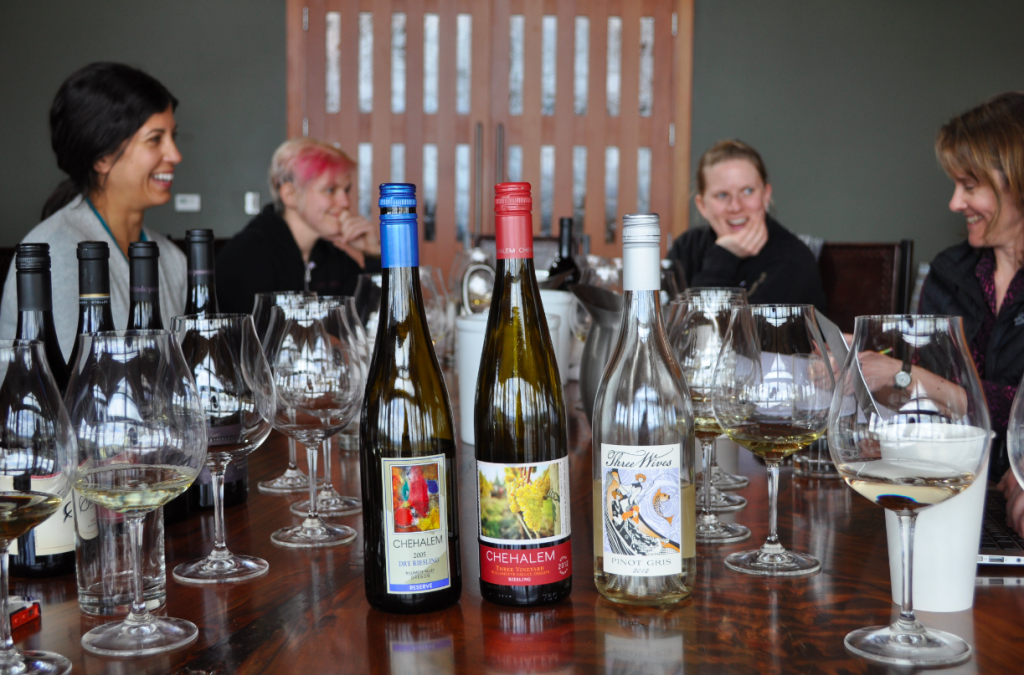
Great Northwest Wine: So was there a defining moment? There’s the cliché question how a specific bottle of wine that you enjoyed led you down this path to the wine industry and to become a winemaker.
Burr: Mine was more of a culmination of life events. For my husband and I, wine became a part of our lifestyle. We were farming people who were really enjoying wines, and our wine knowledge was growing together. His family bought the vineyard. I had a science degree. My mother-in-law — actually jokingly while we were gardening many years ago when I got into graduate school — she told me, “You know, you can drink more wine than anybody I know. (Group laughter). You love wine. You’d make such a good winemaker the way you love to cook and love all the different flowers in the garden.” She said it, but I was a little annoyed at the time because I just gotten into graduate school, but all that stuff culminated into this, “Ah hah!” Then, after that first internship at Cooper Mountain, I really knew that I loved it. I liked the harvest. I liked the challenge. I liked all that stuff.
Great Northwest Wine: I cannot imagine. Your first job was 16,000 cases?
Burr: Yeah, it was all right there for the taking. I thought it was a neat opportunity, and I had a lot of help.
Great Northwest Wine: Remy, was there an ah-hah moment for you?
Drabkin: I wanted to be a winemaker since I was a little girl. It wasn’t because my parents were in the wine industry. We lived in it, and I wanted to be a winemaker. Always.
Great Northwest Wine: With that in mind, were you training yourself as a little girl? How did you prepare yourself as you were growing up?
Drabkin: My parents encouraged me to taste and smell wines. I loved climbing in fermenters. Maybe knowing what I was getting into was the best preparation because I knew it was going to be cold and wet the majority of the year. And that was fine.
Great Northwest Wine: Wynne, it was almost your destiny too, right?
Peterson-Nedry: It was, but I was never pressured into it, but I definitely chose to travel another path before I came back to it. I knew that if I had started it right out of college, then I would have always wondered “What if? Why didn’t I go out and try other things first and experience the world a little bit?” So I did, and I realized that it doesn’t compare (to winemaking). I was in upstate New York, so maybe that helped out. It was cold and snowy, and I worked for a pharmaceutical company. It was 9 to 5 and you wanted to get done with your day as soon as you could so you can get out of town and go visit your friends. That’s what living was about. It wasn’t about the job. It was about “after the job.” I got compensated well, but that didn’t matter. I also got sent harvest gear and free wine from my dad – that kind of beckoned me back. (Group laughter)
Penner-Ash: Ah, so that’s how he did it. I may have to take that under advisement. How to manipulate your children!
Peterson-Nedry: Care packages and harvest swag. And then I did move back to Portland and worked another lab job and realized that I was spending all my free weekends at the winery – during harvest, especially. I figured that if I was going to be doing that, then I might as well be getting paid for it. Yeah, it’s a great lifestyle and one of the best professions I can imagine for being in a family. I’m very fortunate.
Great Northwest Wine: Speaking about the next generation Lynn, are your children at all interested about being in the wine industry?
Penner-Ash: That’s a really good question. Our son is 21 and our daughter is 18, and he’s studying geology up at Whitman College, and the professor (Kevin Pogue) is really big into terroir, so who knows? But it’s similar to Wynne’s story. There’s no pressure. There’s no expectation.
Peterson-Nedry: (Your son) won’t tell you until he’s decided himself.
Penner-Ash: Exactly. We have no conceived idea that he’s going to actually participate at this point. And our daughter is 18, so who knows what the hell she’s thinking. (Group laughter), but I’ve got a couple of years left in me (as winemaker).
Great Northwest Wine: What are your impressions of how the Forbes series on female winemakers played itself out? Did you pay any attention to that?
Penner-Ash: For me, it was very interesting to see all the different comments of people saying, “Don’t forget this person” and “Don’t forget that person.” It was good for me to see there were that many names. Some of the comments were pretty negative considering the poor woman was just trying to write a story. Maybe her semantics were incorrect. So many times you see that anywhere – something about “The best rosé I ever tasted” and then you find out they only tasted five of them. It really surprised me that it struck such a chord with people when it was just a story. But I was one of the women (profiled), so maybe the chord is somewhat biased, too.
Peterson-Nedry: She really didn’t look into the piece that closely. It was obvious to me that it was just a reporter who wanted to write something about some thing they had heard might be interesting and took the first few things that she could find about her subject and put it together. It wasn’t incorrect. (The list) was just totally lacking.
Great Northwest Wine: It inspired me to come up with as complete of list as I could of all the female winemakers in Oregon.
Penner-Ash: It was interesting how people would fire off the names. And yeah, you forgot Luisa Ponzi!
Great Northwest Wine: That was the one that really got me going.
Penner-Ash: All these people came out with their lists, and not any one of those lists was complete.
Burr: I liked the energy behind it, which was interesting – but I was also one of the women who was interviewed. I can’t remember when mine ran.
Penner-Ash: You were third in the sequence. And I got killed. (Group laughter)
Burr: Yeah, and it was entertaining. I’m glad that people care about what’s going on in the industry. It was good coverage for Oregon.
Penner-Ash: And people are reading it.
Great Northwest Wine: Americans love the underdog. Obviously, based on the percentage of the industry, you are a minority. Do you think that helps you gain a following?
Peterson-Nedry: I think in this case, where so many of us got slighted, so to speak, it brought more attention to the fact that, “Oh, there are a lot of women. Oh, maybe we should pay attention to that.” I think that in and of itself brought more attention. I don’t know about an underdog, but yeah, a minority and something that maybe people should pay attention to.
Burr: I think it can and does hold interest for people, and I think that will help in someways sell your wine. I don’t think it’s something that any of us want to lead with, but there are people who are interested in the fact that a woman made the wine and they really like that. So that’s a positive thing for what we’re doing.
Great Northwest Wine: So do you find that female wine drinkers, consumers, support you more?
Drabkin: I think that’s true industry-wide. Our purchasers are women within a certain age group – 35 to 55.
Burr: Once in a great while, I run into, “I’m so excited to meet you. You’re a woman winemaker and I love your wines.” That’s awesome.
Penner-Ash: I think women who come into the tasting room are more enthusiastic about their response to you as a woman. I couldn’t break our demographics down that distinctly. We have quite a fan base that is both male and female in all age groups. Women when they find out (the wine is made by a woman) are much more vocal about that, and they are very excited by that, which is fun.
Great Northwest Wine: Remy, you are the only one here who doesn’t work with Pinot Noir. Why is that?
Drabkin: I don’t have a specific reason. When I lived on the East Coast for a while, I ran an Italian restaurant and bakery. The men shipped in all theses grapes from California and made wine in the basement of the restaurant. And that’s what we drank, and they were really delicious wines. I liked that, and when I came back (to Oregon) I looked specifically for Sangiovese, and I found some other Italian varietals. When I decided to make wine commercially, I didn’t see a reason to stop what I’d been doing. I’m going to do what makes sense, and I just kept going.
Great Northwest Wine: What’s it say about Oregon for there to be such a concentration of female winemakers? Is it opportunity? Is it because it’s a great place to live?
Penner-Ash: I’ve been thinking about that question. It wasn’t that easy to get started in the industry. There were no suppliers. It was really an interesting experience. I had a bottling line that broke down back in 1988, and it took almost a year to get the piece shipped. I’m sitting there wondering, “What the hell do I do now?” because there were no mobile bottling trucks. So we had to go borrow someone’s bottling line and bring it to Rex Hill. It was a lot more difficult in the early years, but that said, (the Willamette Valley) had nowhere near the age or generational aspect like that in the Napa Valley. Those wineries had been started by a lot of guys who were very traditional guys and traditional families, and to think about a woman coming in and working in their winery was just not done, whereas Oregon was more pioneering, more couples starting out together. Their winery was their brand. There was a quality in the brand from the get-go, so to hire the next person if it was a woman was OK because (the husband and wife) were working side-by-side. It wasn’t a big issue to hire a young woman starting off.
Peterson-Nedry: I would say in general that’s true, too. It’s not necessarily just Oregon. When I was at Davis, in our class of 11, six of us were women. It’s just becoming a more normal thing that women are on an equal playing ground with the men. I mean, we’re still only 20 percent max of this industry? That’s still 80 percent men.
Penner-Ash: I think it’s easier to get started in Oregon than in California. I think when we first started it wasn’t as daunting to buy an acre of land as say in the Napa Valley. It was more established there, and more prestige was attached to it. I think that is very quickly changing around here also. It’s only a $109,000 dollars (an acre in the Willamette Valley), not $109 million. (Group chuckle).
Great Northwest Wine: What about mentors? Melissa, you mentioned Rich Cushman (at Viento).
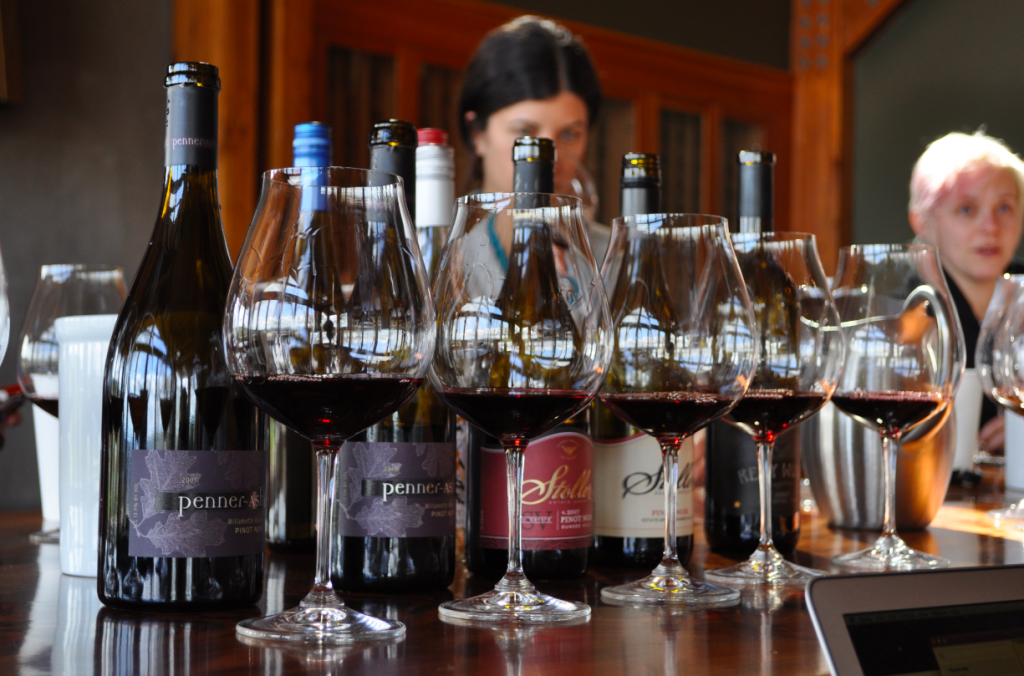
Burr: He’s definitely the big one for me. He did a lot of mentoring for me, especially those first few years. I do like working with colleagues in the Dundee Hills, and we keep pushing the pursuit of the highest quality possible, and I think that’s reflective of what’s happening in the Willamette Valley. That’s a group mentorship, which sounds kind of vague, but that works best for me. I’ve also been at Stoller for 10 years. One vineyard. One site. So my story is a little different from most folks because of that focus and the work to continue to elevate it.
Great Northwest Wine: Lynn, I remember Andy Perdue and I visiting with you (in 2005) and you talked about how much sharing of knowledge there is within the industry in Oregon. In Washington, Ste. Michelle’s role is so huge and they are so open with sharing their research. In Oregon, it seems as though the wine industry has to rely on their own people to share their knowledge. Is that a fair statement?
Penner-Ash: I think so. We’ve always had great successes in working together. I’ve been over to Melissa’s cellar with my tasting group and tasted through and talked. In 2005, (Melissa) had a lot of good questions for all of us, and we were genuinely trying to figure out ‘this’ and “Have you talked about that?” It’s always very fun, and I find that very energizing to be out with colleagues tasting in another’s cellar and talking about what they’ve done or haven’t done. I was just over at someone’s cellar recently, and I said to myself, “Ah, why haven’t I ever thought of that? That’s such a good idea.”
Peterson-Nedry: I think that the Steamboat Conference for Pinot Noir every year is a good example of that. I know the majority of the faces I see there every year are Oregonians, with a few Californians here and there, and the great sharing of knowledge.
Penner-Ash: And the great story behind that it is (Steamboat) was supposed to move from Oregon to California to France, but the French and the Californians didn’t think they could have their colleagues sit there and be as willing and open as the Oregonians were to participate. It’s our culture up here, and it’s very different.
Peterson-Nedry: And you have to cross the border to get back. (Group chuckle)
Penner-Ash: But wait, don’t take any Pinot from us or … (Group chuckle)
Great Northwest Wine: Remy, are your mentors still in the basement of that restaurant?
Drabkin: No, I don’t emulate their winemaking style. (Group chuckle). I worked my very first harvest with Luisa (Ponzi) when I was 13, and I’ve always looked up to her. I worked for Rob Stuart all the way through high school and after high school when he was at Erath. And I spent a number of years working for Rollin Soles (at Argyle) as well. I don’t know that they influenced my style necessarily, but definitely my protocols, which are invaluable things.
Great Northwest Wine: I should probably make sure about your age when you started. What’s the child labor law? Is it 13 or 14? (Group chuckle)
Drabkin: Fourteen, I was 14. (Group chuckle)
Great Northwest Wine: And Wynne your father …
Peterson-Nedry: He was a great influence, but I also left before I got started in order to bring back some of my own knowledge from other places. The first harvest I worked fully, I went intentionally to another female winemaker, Claire Mulholland, and worked for her in New Zealand. I learned a lot for her.
Penner-Ash: And Claire worked for me at Rex Hill and then worked at Chehalem.
Peterson-Nedry: It’s a very small industry, but yeah, I wanted to see what it was like for women winemakers in other places, too. It was interesting to work for her, and she gave me great opportunities. I was in the lab for the majority of my internship. That means sampling everything myself and seeing every ferment all the way through, helping her make decisions day after day. Every day, she’d come up and taste, and I could discuss the wines with her. And I did that again in Burgundy and had great opportunities there. Everybody I’ve worked with has influenced my palate and my perception of things, but none more so than my dad.
Great Northwest Wine: Regarding women winemakers elsewhere, did you get a sense for the differences?
Peterson-Nedry: They were harder to find than I thought. To this date, Claire is the only woman I’ve worked for. I’m glad that I did, but yeah, in Burgundy there are a few, but not a whole lot. I visited with Veronique Drouhin when I was there, but she was the only one I can think of.
Great Northwest Wine: Can you liken it to men chefs?
Peterson-Nedry: Perhaps. Maybe it’s just as stressful, except (winemaking) is a cold and wet position. I can see why some women self-select themselves out of that kind of profession. (Group chuckle). But yeah, there are similar industries. There are periods of time when you don’t get a whole lot of sleep and are under a lot of pressure.
Drabkin: And then there’s Sunday. (Group laughter).
Peterson-Nedry: Your pants smell like old leaves. You are tired and cold.
Penner-Ash: People think you fix engines for a living.
Peterson-Nedry: Yeah, when I drop off wine at restaurants, people think that I’m delivery personnel because of the way that I’m dressed. I don’t want to ruin my nice clothes! (Group chuckle). You have to be able to lift barrels and do that kind of stuff, and not all women want to do that. I made mud pies as a kid, and that kind of gears you up for that.
Drabkin: I love that aspect of it. I love that you have to be strong in a very literal sense. Mentally and physically.
Penner-Ash: I love that you don’t have to dress up.
Burr: I like clothes, but I also like that you don’t have to look nice at the end of the day.
Peterson-Nedry: I’ve never had an affinity for heels.
Penner-Ash: Should I wear that black vest or the gray vest today? (Group laughter)
Peterson-Nedry: Or which vintage of black vest? (Group laughter) The 2006 or the 2010?
Great Northwest Wine: They say “Pinot Noir is a feminine grape.” Do you agree with that?
Penner-Ash: Because it has one less tannin group than Cabernet? I think it’s a more finicky grape, and they are trying to equate that to women vs. men? I don’t know, but it’s one of those grapes that takes a lot more attention than Cabernet does, having made Cabernet for many years (in the Napa Valley). Pinot Noir reflects more of what’s done to it than Cabernet. I think you can mask a lot of bad winemaking. Ooh, am I going to say that? (Group laughter). But Pinot Noir really is quite reflective of who is working with the grape. It wears its feelings upon its sleeve, to put a cliché to it. It’s pretty obvious.
Peterson-Nedry: Not to say that all women are like that.
Penner-Ash: Right, that’s why I don’t want to equate (Pinot Noir) to feminine vs. masculine. We used to say, “It’s the graduate school of winemaking.”
Great Northwest Wine: You still don’t?
Penner-Ash (in a hushed tone): I still say that. (Group chuckle). It’s takes a real woman to make great Pinot Noir. (Group laughter).
Great Northwest Wine: That’s sounds like a bumper sticker!
Peterson-Nedry: We should get T-shirts made. (Laughter).
Great Northwest Wine: Has the climate for females in the wine industry changed?
Drabkin: Generally, I’d say the answer is “No.” It’s not specific to the wine industry, but more of society that we are still treated as women as opposed to as equal. We like to pretend that our society treats men and women equally, but it just really doesn’t it. At the symposium I was just in, I was looking at some equipment with every intention of purchasing. I have a piece of equipment that’s not working, so I was approaching this (symposium) as “Perfect, I’m going to buy something new instead of something used,” and I stood in front of one (exhibitor’s) booth. I tried going to the sales guy, and he ignored me. Then a guy came and stood next to me, and (the salesman) walked right over to him and said, “How can I help you?” So I stood there a little longer and asked, “Can I ask you something?” and he said, “Just hold on a second.” Then another guy walked up, and (the salesman) went over to see if he could help him. So I walked away. It’s not industry-specific. Women aren’t given equal footing yet.
Peterson-Nedry: I can’t tell you how many response emails I’ve gotten back that say, “Hi, Wayne.” Thanks for your email. (Group laughter). Really? I guess with a weird name I get that.
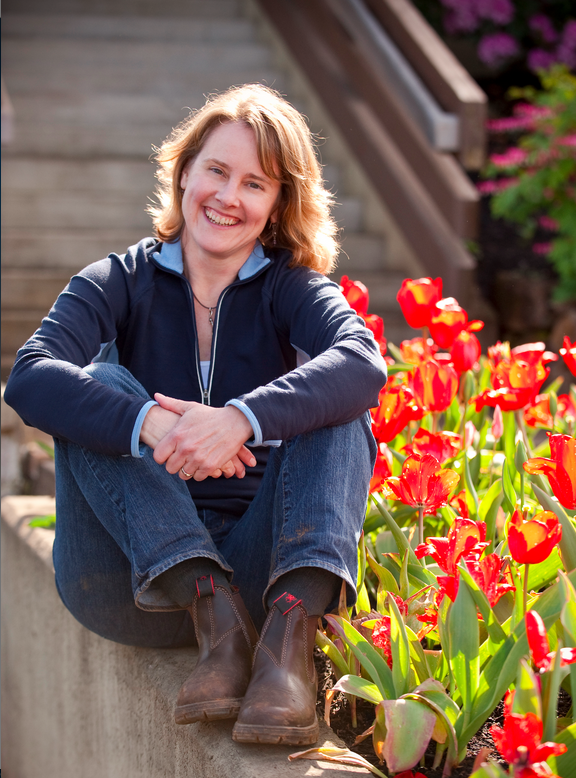
Penner-Ash: We try to hire women as 50 percent of our interns. I remember as a young woman it was hard to get an internship, so we always try for that percentage breakdown. Sometimes it is difficult. You don’t necessarily get that same number of candidates. Last year, our crew was almost all women, with only two guys, which was kind of fun. Very different. (Group chuckle). We did “punch-down aerobics” instead of punch-down whatever the guys were doing. We very much try to support the women who come along in the industry.
Burr: Over the years, I’ve made it an unspoken prerequisite to have at least half of the harvest crew be women. Not only because of the opportunity, but also because I feel it creates more balance during harvest. And people are on better behavior. (Group laughter)
Penner-Ash: Plus the kitchen is cleaner.
Peterson-Nedry: Yeah, for the first time Chehalem has me as the winemaker and our assistant winemaker is also a woman. That’s interesting.
Great Northwest Wine: My wife has some stories similar to Remy’s.
Burr: I get asked, “So who’s the winemaker?”
Penner-Ash: Yeah. “What do you do here?” That’s the question I like.
Burr: “Are you in marketing?”
Peterson-Nedry: “So is your husband the winemaker?”
Penner-Ash: My all-time favorite? We went to France. I spoke French. I talked to the winemaker there in French. And they talked directly to Ron, my husband. And it’s hard not to notice their eyes are watching and talking to him the whole time you are standing there and talking to them. Hello!
Peterson-Nedry: During my internship there (in France), I would be going around and moving hoses or shoveling out a tank, and they’d be, “No, no, no. We’ll do it for you.” Really?
Burr: That is really annoying. It happens sometimes. With Noah (Bieszczad), our assistant winemaker, a lot of people will just look at Noah the whole time. Really?
Penner-Ash: That’s where we get into the gender specifics. And this happens all the time during interviews, I’ll say, “I’m Lynn Penner-Ash,” and they’ll say, “What do you do? Do you know anything about what they are doing down there (on the production floor)?” I just want to go, “No, I know nothing,” and walk away, but you can’t be flippant. You have to be polite. You have to take a big breath and put a really great face on it. And sometimes, it’s really, really difficult because you just want to jump up. And they also talk to Brian (Irvine, the assistant winemaker) as if I had no clue in my head as to what is going on downstairs. “You realize I pay him to do that for me?” But I can’t say that either. It’s hard.
Drabkin: So we could probably keep going with those stories for a while? (Group laughter).
Penner-Ash: Can I tell one more? “Honey, you want me to find a man to fix that for you?”
Drabkin: I’ve got one to rival those. So a truck pulls up to pick up some wine. I was sitting on the forklift and he looked at me, and all he said was, “Where the man?”
Peterson-Nedry: Seriously?
Drabkin: I was like, “There isn’t one here. I don’t know.”
Penner-Ash: We had a truck driver who didn’t want our interns to off-load his truck, either. He didn’t want a woman on a forklift off-loading his truck, and that was the year I had mostly women on staff. (All the men) had that day off, so I told him, “Well, then you better do it yourself, dude.” And I walked away.
—
At that point, it was suggested the group create T-shirts that read, “I am the man!”

Articles like this are what make it sexist. Women have a strong place on our industry. This interest is tired. A life of a winemaker is a life of a winemaker. Its no different to which is your sex.
CBVines,
I guess I don’t see how this article makes it sexist. This was not the typical, banal article about women winemakers.
If you read through the interview, you might have noticed that it brings up a wide-ranging number of topics that these winemakers have faced – and haven’t faced – because they are women working in a male-dominated field.
Particularly interesting is the discussion on the sexism they have faced – and continue to face.
I’m sorry you saw it differently.
Sincerely,
Andy Perdue
Great Northwest Wine
Can you send me a link to the research that found women only make up 10% of the industry in Oregon?
Here is the link,
https://greatnorthwestwine.com/2013/02/14/oregon-female-winemakers/
yet it is worth noting that this was published more than four years ago and the list was limited to head winemakers.